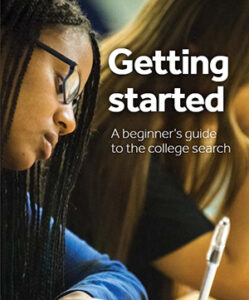We know that virtual visits just aren’t the same as an in-person, on-campus visit. But there are some advantages and opportunities that the current situation presents—especially if you’re strategic about your search. The below tips will help you get the most out of virtual college visits so you can refine your search and find the best college or university fit for you.
1. Schedule virtual college visits like you would in-person visits
While it’s tempting to sit down in front of a screen and start clicking and tapping away, you’ll be better served by dedicating a couple of hours to focus exclusively on each college on your list that interests you. Even when doing in-person tours, colleges all start to blend together after a while. This is even truer when researching colleges online, so by setting aside a specific time to explore each school, you’ll reduce confusion and get a better sense of the places that might be a good fit.
2. Structure your “visits” to cover the basics and your interests
Typically during a college visit you’d take a campus tour, attend an information session and possibly have an interview with an admission counselor. Use this structure for your virtual visits as well. It will give you a baseline against which to judge the colleges you’re considering and compare to future in-person visits. Take advantage of the opportunity to ask questions about admission requirements, financial aid, academics, dining, dorms and life on campus. Most colleges will have a number of virtual options for all of these activities as well as ways to dive deeper into specific areas that interest you. And the ability to ask questions via chat during video sessions means no worries about having to raise your hand and the chance to get all of your questions answered live or in a post-session follow up.
3. Talk to a real live human
You know those infomercials that end with the voiceover guy saying, “Operators are standing by to take your call”? Yeah, that’s what admission counselors are doing right now. With fall travel cancelled for most schools, admission counselors have the time and desire to connect with students online in any way that they can. And don’t limit your conversations just to admission counselors. Many schools have financial aid counselors, current students and professors who are eager to connect with prospective students to talk about their respective schools and experiences.
4. Take notes and keep score
Make a point of having a list of questions that you ask each school, whether during an online info session or interview. The responses to these questions can help you rank schools based on their desirability as it relates to your interests and must-have features. Take notes about aspects of a school that are unique or particularly appealing or unappealing to help narrow the list of schools that you decide to apply to.
5. Get on the list so that when on-campus events resume, you will be first in line
While most colleges aren’t offering on campus tours right now, they will inevitably begin offering them again in the months ahead—and likely at reduced capacities. This means it might be more difficult to schedule tours and get to campus when you want to. By getting on their mailing lists, you’ll be among the first to know when on-campus tours do become available.
Explore your options
We hope these tips will help as you conduct your college search in the weeks and months ahead. Explore other brochures we have to aid you in your college search or explore the various options to visit us virtually.



